Tropical plants are known for their bright colors, unique textures, and large-scale statements. Add tall plants with jumbo leaves and transform your outdoor space into a tropical getaway. Try any of these tropical plants in an oversize container and notice the energy and impact they infuse into your border or deck.
Many tropical plants or their bulbs can be brought inside during the winter if you want to save them. To make tropicals easier to relocate, plant them in containers made of lightweight resin or pots with casters on the bottom. The tubers of cannas, caladiums, dahlias, and sweet potato vines can be dug up in the fall and stored indoors in a cool, dry place until spring.
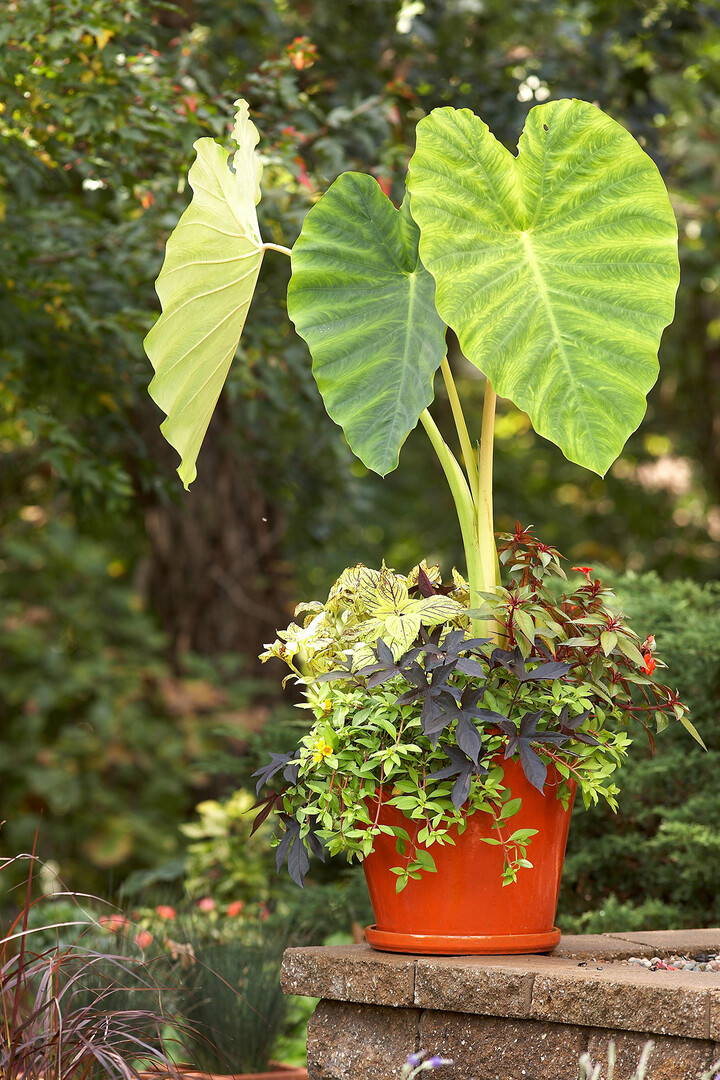
Tips For Planting Fail-Proof Combos
Be sure to choose the right combination of flowers and pair it with a container in an appropriate size. Use these tips to build a tropical container garden that will thrive.
Choose the best pot for a container garden: When choosing a pot, the bigger the better to keep your plants healthy. Find a pot that either picks up the accent colors of your plants or provides a neutral background to the lush foliage. Finally, make sure the container has good drainage, with ⁵⁄₈-inch diameter or larger holes.
Use the best soil for tropical plants: Use good-quality, lightweight potting soil mixed with about 20 percent compost.
Choose the right foliage: Choose a maximum of four flower or foliage hues.
Build the container garden: When planting, start with the tallest or biggest element—such as a banana tree, a palm, or a canna—as the focal point. Set the focal point to the side for an asymmetrical look or in the center if the pot will be viewed from all sides. If the container will be set against a wall, place the largest plant to the back of the pot to create more planting room in front. Mingle flowers and foliage to create a small but lavish expression of the tropics.
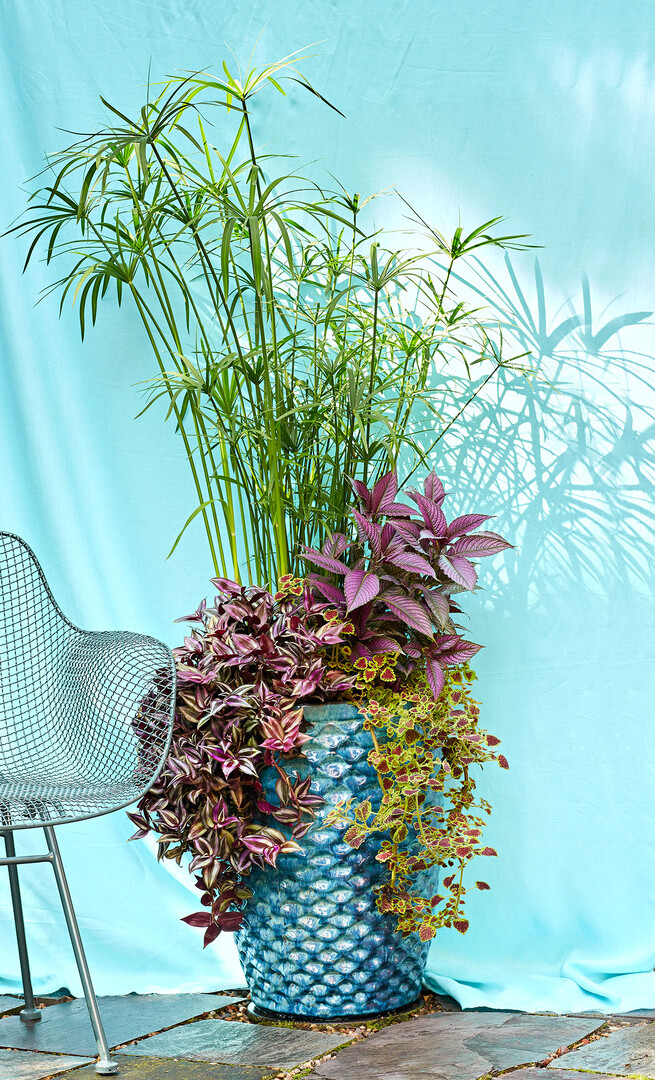
Papyrus
A tall papyrus exudes the same breezy feel as a palm tree (but scaled down for the backyard). Purple-tinged trailing plants ground the arrangement (an inch plant is on the right and Stained Glassworks ‘Burgundy Wedding Train’ coleus is on the left). The silvery-purple Persian shield provides a little sheen and fills out the middle. Papyrus does well in sun or shade and loves water. Don't let it dry out!
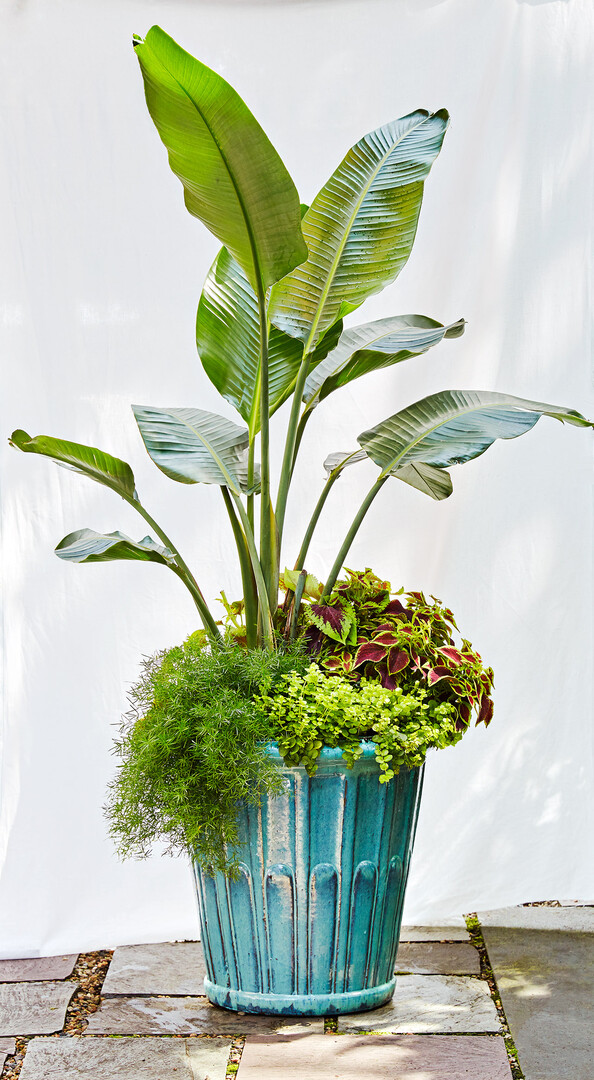
Bird of Paradise
The giant leaves of bird-of-paradise resemble a banana leaf, but the plant is much more drought-tolerant. For textural and color contrast, underplant it with frothy asparagus fern, red-heart coleus, and chartreuse creeping Jenny. All of these plants like bright light but prefer to be shielded from harsh midday sun.

Cordyline
Pick a theme to achieve a cohesive look even with different plants. In this case, matching pots underscore the similarities between a collection of pink-tinged plants. ‘Rubra’ cordyline and bloodleaf, a cream-striped bromeliad, and a Siam tulip all do well in part shade. Natives to Southeastern Asia and Brazil, these plants like high humidity.
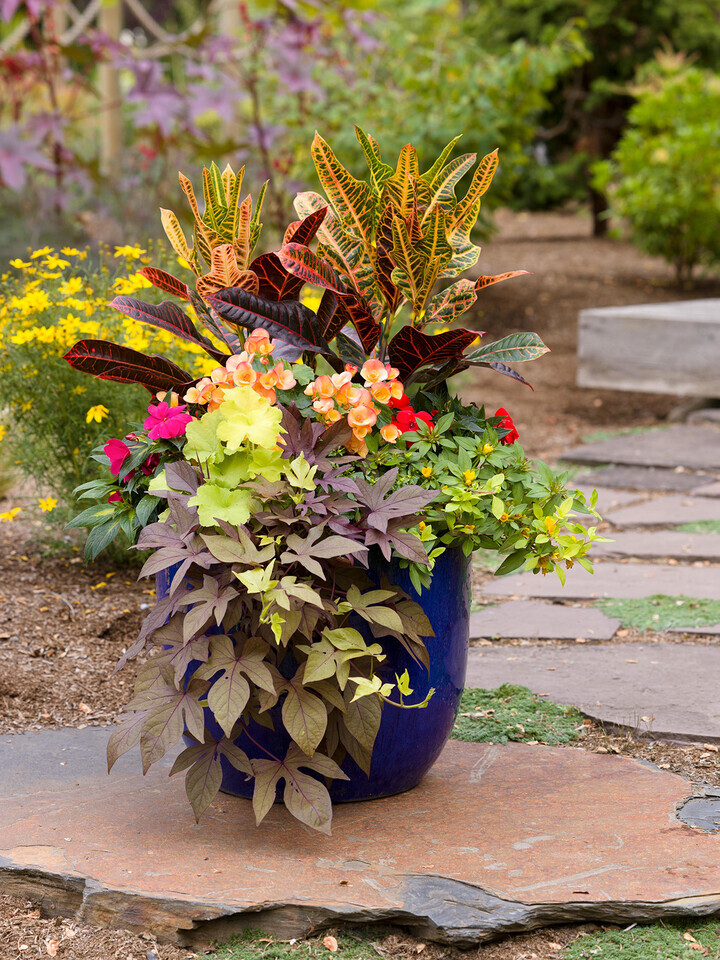
Croton
In this brilliant cobalt blue pot, an oakleaf croton stands out as the design's upright element. Echoing its carnival colors is a glorious mix of colorful plants: ‘Sonic Hot Rose on Gold’ New Guinea impatiens, ‘Karen’ Rieger begonias, Heuchera villosa ‘Citronelle’, ‘Sweet Caroline Bronze’ sweet potato vine, and ‘Sundew Springs’ Lysimachia. The combination of foliage hues and warm-toned flowers makes this container garden and point of interest, texture, and color.

Begonias
Foliage is key in this design, starring the dramatically textured palm leaf begonia (Begonia luxurians), which can be brought indoors as a houseplant at the end of the season. Golden creeping Jenny drapes over the edge of the pineapple-texture pot, and a ‘Painted Paradise Red New Guinea’ impatiens adds beautiful dark contrast in flower and leaf. This grouping appreciates afternoon shade.
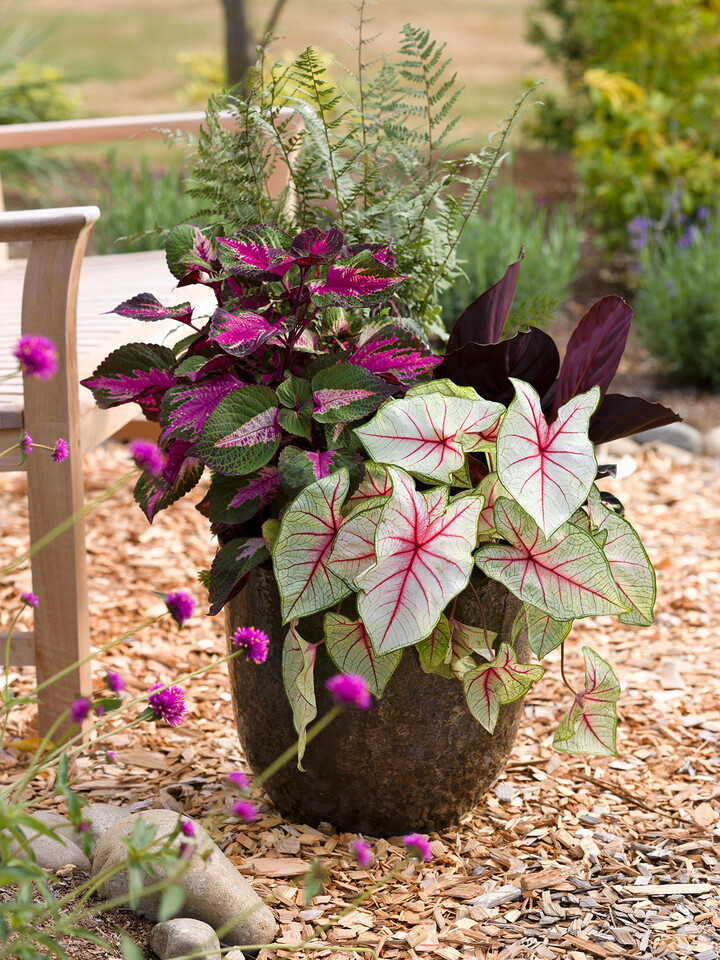
Caladium
Caladiums, especially the bicolor varieties that have white or pink leaves, bring much-welcome color to part-shade containers. This easygoing collection of tropical-punch colors combines pale caladiums with rosy centers, purple-and-green Magilla perilla, the dark-purple leaves of Calathea ‘Dottie’ , ferns, and the feathery contrast of a ghost fern (Athyrium ‘Ghost’ ). Because this container has no flowers, you can rely on color and texture all summer and eliminate the need to deadhead faded blooms.
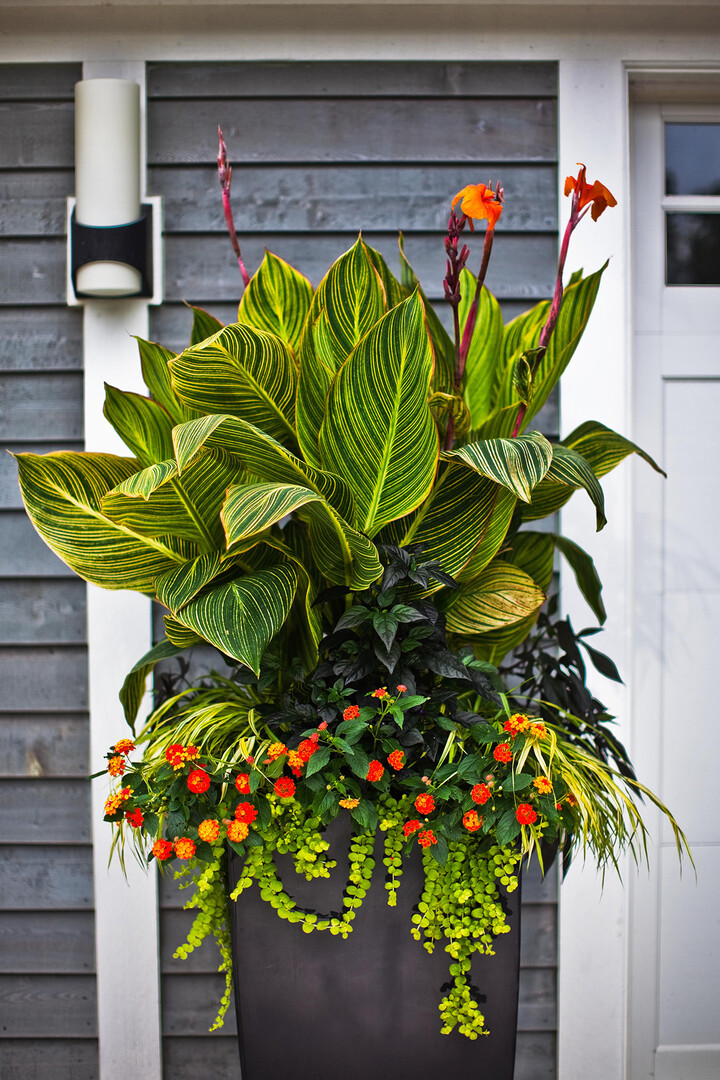
Canna
With lavish, oversize foliage and vivid blooms, cannas such as the top plant here, provide vertical sizzle in gardens and large containers. The Tropicanna or Pretoria cannas have especially gorgeous striped leaves. The dainty foliage and color variation of carex and creeping Jenny pair well with the canna's large leaves. ‘Luscious Citrus Blend’ lantana and ‘Midnight Lace’ sweet potato vine break up the green in the container and emphasize the distinct heights of the plants in this display.
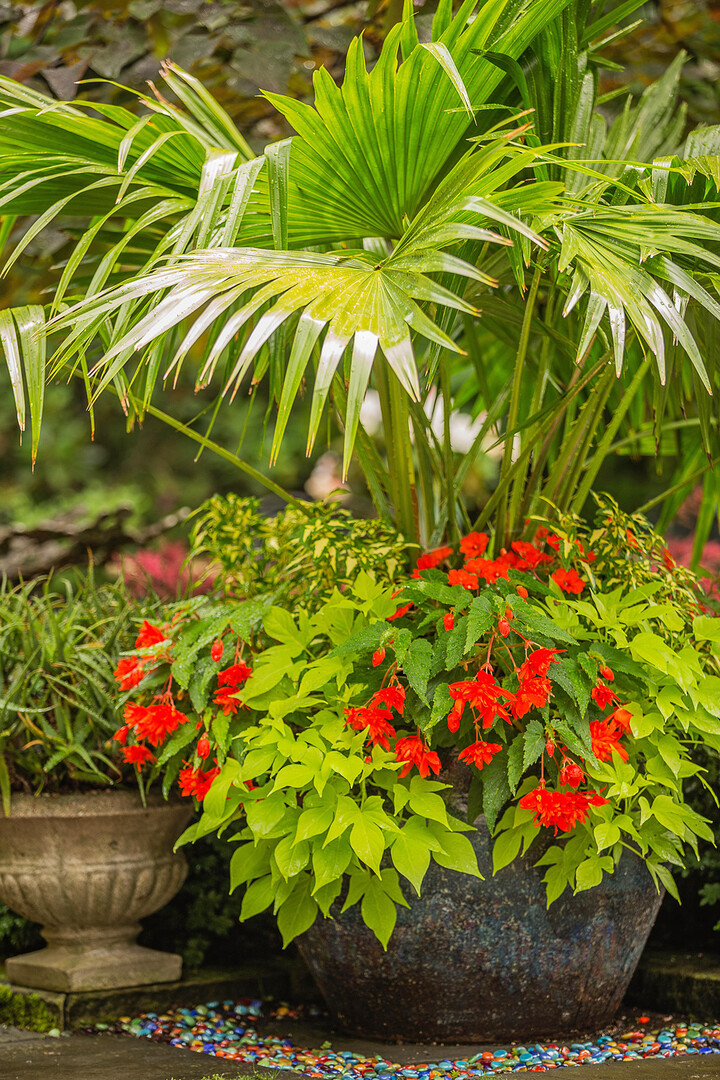
Palms
Verdant palms, including Trachycarpus fortunei seen here, are cultivated for their fan-shaped foliage and breezy, easy attitude. The plants can spend the winters indoors, by a sunny window, and go outside when the weather warms up in late spring. In this container, a Chinese fantail palm sways above ‘Alligator Tears’ coleus, chartreuse ‘Marguerite’ sweet potato vine, angel wing begonia, and a bright orange-blooming New Guinea impatiens.
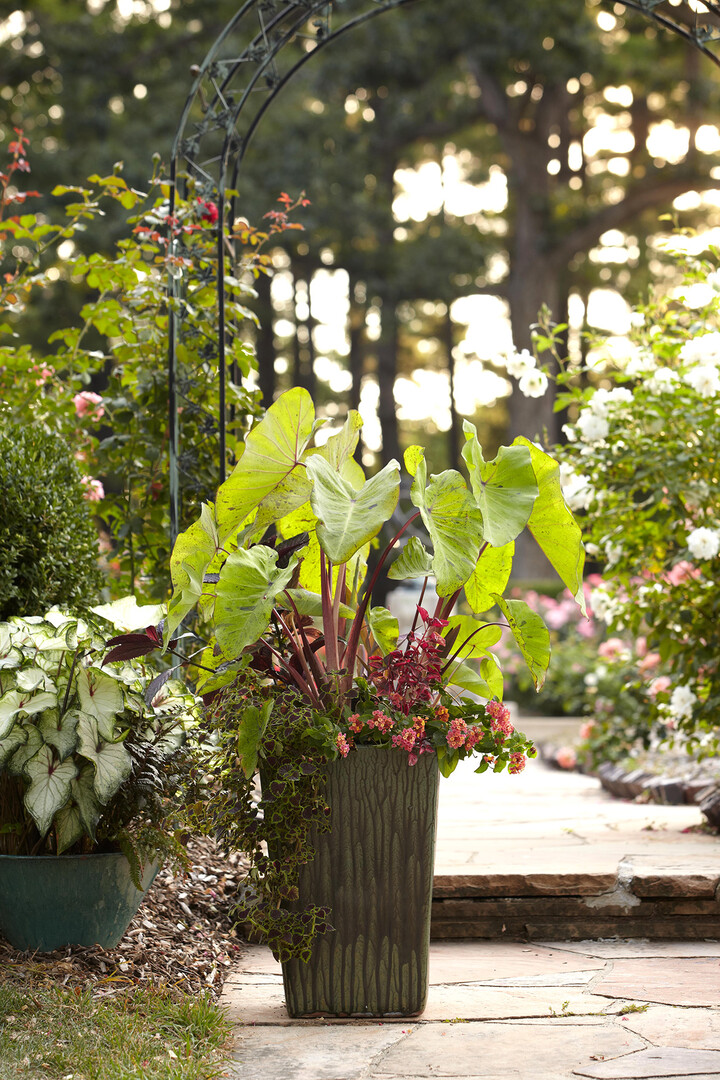
Elephant's Ear
Elephant's ear stands out as the ultimate container plant with its oversize leaves and tropical flair. Evoke the feeling of an island paradise with a container bursting with spotted elephant's ear (C. esculenta ‘Hawaiian Punch’), which features a high-contrast red stem. Pair with pink lantana, burgundy variegated coleus, and bloodleaf (Iresine herbstii).
Tropical plants boast big, bold foliage and colorful flowers that make any container feel like paradise. These plants are the perfect way to fill an empty corner of the garden or patio with height, texture, and bright color. Try our tropical plant pairings or create your own for your next container garden.